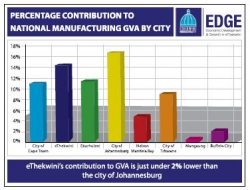What role can manufacturing play in Durb an and South Africa’s future?2014-12-05 The DCCI, in collaboration with SEIFSA KZN, recently hosted a meeting of their manufacturing members. The event was met with much enthusiasm, as over 60 manufacturers attended to voice their views on the state of their industry. Common concerns included tension in labour arrangements, coupled with rising electricity costs, a complicated regulatory environment and increasing competition from cheap imports as well as a shortage of skilled workers.
Manufacturing has for many decades been a major contributor to GDP and employment in the greater Durban area. Ajiv Maharaj of eThekwini’s Economic Development Unit highlighted that the textile, metals, transport and petroleum manufacturing sub-sectors are the largest contributors to eThekwini’s economy. Glen Robbins of UKZN provided some of the preliminary results of the eThekwini Municipal Area Large and Medium Manufacturing Firm Survey currently underway. Preliminary findings include the fact that the number of firms importing from outside of the country is rapidly increasing, while the value of Durban’s exports has decreased, i.e. Durban is becoming increasingly reliant on exports. Another finding is that nearly a third of the sample is no longer operating as a manufacturer, while a further group are still operating, but no longer engaging in manufacturing activities. Some firms have been successfully engaged in expansion projects and strategies which include product specialization and niche thinking. Other factors that may have contributed to growth include a better understanding of Chinese and African markets including a focus on technological advances, productivity and marketing Maharaj added that the City has established several interventions to assist local manufacturers, including the Durban Automotive Cluster; the Durban Chemical Cluster; the eThekwini Maritime Cluster; Use-It (a waste materials industry development intervention); the Durban Clothing and Textiles Cluster, and the KZN Tooling Initiative. There are two local government strategies which are relevant for manufacturers, the eThekwini Economic Strategy, with its focus of unlocking industrial development, and the Industrial Land Strategy, which focuses on both greenfield and brownfield projects. Ndumiso Mlambo, of the Best Practice City Commission (BPCC), said that the purpose of the BPCC is to facilitate investment linkages and reduce the cost and time associated with investment and doing business in Durban. Ndumiso closed by stating that the way forward is to engage with individuals firms to understand their needs, and couple incentive schemes with schemes in specific geographic areas. Prasheen Maharaj- Southern African Shipyards encouraged the audience not to sit-back and dwell on the dire state of affairs in the manufacturing industry, but rather take the initiative to exploit government policy and strategy. Should you be interested in engaging in this Forum, or should you have any concerns as a local manufacturer, please contact Shivani Singh singhs@durbanchamber.co.za for more information. |
What role can manufacturing play in Durb an and South Africa’s future?
Copyright © 2024 KwaZulu-Natal Top Business
